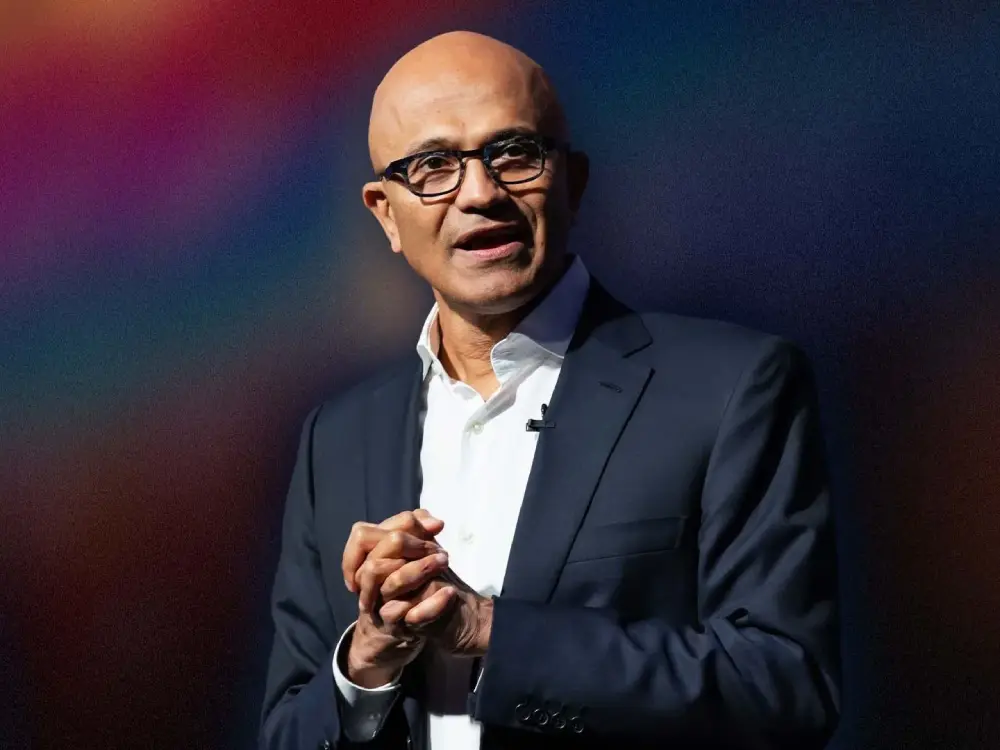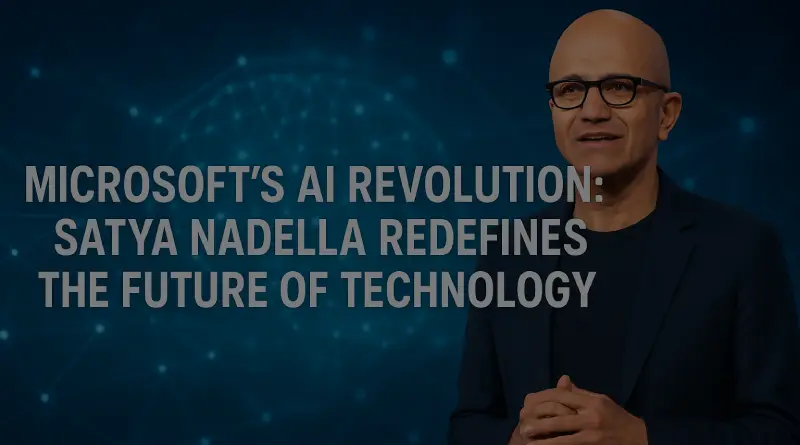Microsoft’s AI Revolution: Satya Nadella Redefines the Future of Technology
In one of the most radical steps to reinvent Microsoft, its Chief Executive Officer, Satya Nadella, has made the revelation of a colossal change of identity of the tech giant towards a new horizon of becoming an AI-powered intelligence engine that will step out of its childhood days of the famous software factory. Coined in a recent internal memo, this shift is indicative of Microsoft’s ambition to provide AI tools to each and every person and organization across the globe, literally redefining how technology can be created and consumed. Long-term visions by Nadella as he takes the company through this crisis period are highly reflective of the opportunities and issues of the coming era of the AI-powered world, which raises questions of industry, community, and economy in the world.
From Software Factory to Intelligence Engine
Nadella is contrasting this vision with that stated by Microsoft co-founder Bill Gates, who envisaged the company as a software factory that would offer standardized software solutions. Although such an approach advanced Microsoft to world leadership, Nadella asserts that it can no longer keep up in the fast-paced technological world of today. Bill had a vision of a software factory that was not limited to a product when he started Microsoft in the proximity of Seattle. That thought served us well over the last decades, and now, it is not sufficient anymore, as Nadella wrote. Rather, he would like Microsoft to be a platform that opens the possibility of innovation to all 8 billion humans on the planet by allowing them to build their own AI-driven tools.
It is not only a philosophical change but a structural one. Microsoft is revamping its whole range of technology, including the infrastructure and up to applications, with a focus on the integration of AI. According to Nadella, the competitive advantage of the firm concerns taking these layers and generating a unified end-to-end, making the competition stop focusing on discrete products. This means further encouraging the users, be they researchers, analysts, or developers, to request the summoning of the AI agents with the ability to solve real-world problems, be it streamlining business operations or bringing innovation to local populations.

The Local Context: India’s Role in Microsoft’s AI Vision
India is one of the technological and innovation centers of the world, and it is actively involved in transforming Microsoft. India is an essential market in terms of adopting AI as the country has more than 1.4 billion residents and an excellent technical ecosystem. The India Development Center is the Hyderabad AI hub of Microsoft, and it already plays a major role in AI research efforts in the company, including, in the case of Microsoft 365 Copilot, leveraging AI to increase productivity by automating actions and offering real-time information. Nadella, the son of a refugee, has a different take on this vision with his key focus on inclusive growth. He imagines the small businesses in India (country enterprises, along with urban enterprises) having AI tools to design personal solutions and generate a local economic surplus.
Recent data underscores India’s potential: According to a report released by NASSCOM in 2024, the consumer adoption of AI is projected to grow in India, leading to an AI market of 17-billion by 2027, following the creation of AI solutions by the government through the India AI Mission. This has played in line with Microsoft’s attention towards AI accessibility, something that places the company in a strong position to enable developers and businesses in India to create customized AI apps, further bolstering the digital economy in the country.
Challenges and Opportunities
The vision by Nadella is at a paradoxical time for Microsoft. Although the financial performance has been the highest in the history of the company, with a market capitalization of more than 3 trillion dollars, the company has experienced workforce shrinkage, such as the 15000 layoffs in 2025. Nadella admits that such decisions involve a toll on human emotion and can be defined as representing the enigma of success in such a dynamic industry. It is also part of a strategic readjustment as it phases out legacy functions to invest in AI-oriented talent and infrastructure, as seen in the $80 billion it has allotted to AI projects in 2025.
There is also an ethical concern about the transformation. Nadella stresses the importance of developing responsible AI, and they have to address such concerns as data privacy and security. Of particular concern in India, where data protection is an increasingly popular topic, is Microsoft’s ethical AI in tandem with legislation such as the Digital Personal Data Protection Act that guarantees user trust and fuels innovation.
Why This Matters
The vision of Nadella will put Microsoft in the first line of the global AI revolution, which was similar to the PC boom of the 90s. Empowering people and organizations to develop their own AI tools is not only creating products. Microsoft is creating a whole new cycle of innovation. Such a transition will also revolutionize industries such as healthcare and education, where the efficiency and accessibility of the respective industries can be boosted through the use of AI agents. As an example, according to Copilot AI use, sales teams are already seeing 55 percent productivity gains, which is visible.
To the readers, this metamorphosis helps them explore the significance of adjusting to an AI-powered world. It does not matter whether you are a developer in Bengaluru or a small business owner in Mumbai; the tools provided by Microsoft can enable any of you to build a solution that fits your requirements. As Nadella phrases it, the idea is to simultaneously drive local surplus in companies, communities, and countries, so AI becomes a source of inclusive growth.
Looking Ahead
The fact that Microsoft turns toward an intelligence engine is a risky gamble on the future. The emphasis on the adoption of AI, ethically driven technology, and universal accessibility is setting Nadella on a new path as a leader in the technology realm. With the company further investing in AI infrastructure and partnerships, including its $14 billion partnership with OpenAI, it will influence the next chapter in computing. This is a chance for both individuals and companies to adapt to AI and gain new skills and engage in a revolution that holds the promise of altering the world order and structure.
Disclaimer
The information presented in this blog is derived from publicly available sources for general use, including any cited references. While we strive to mention credible sources whenever possible, Web Techneeq – Web Design Agency in Mumbai does not guarantee the accuracy of the information provided in any way. This article is intended solely for general informational purposes. It should be understood that it does not constitute legal advice and does not aim to serve as such. If any individual(s) make decisions based on the information in this article without verifying the facts, we explicitly reject any liability that may arise as a result. We recommend that readers seek separate guidance regarding any specific information provided here.

